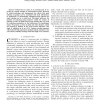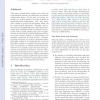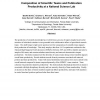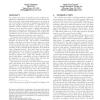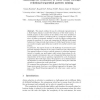139
click to vote
TMM
2010
14 years 8 months ago
2010
Abstract--Cohesiveness in teams is an essential part of ensuring the smooth running of task-oriented groups. Research in social psychology and management has shown that good cohesi...
118
click to vote
SCIENTOMETRICS
2010
14 years 8 months ago
2010
This paper quantitatively explores the social and socio-semantic patterns of constitution of academic collaboration teams. To this end, we broadly underline two critical features ...
143
click to vote
ORL
2010
14 years 8 months ago
2010
Given n clubs with two teams each, we show that, if n is even, it is possible to construct a schedule for a single round robin tournament satisfying the following properties: the ...
138
click to vote
JASIS
2011
14 years 9 months ago
2011
The production of scientific knowledge has evolved from a process of inquiry largely based on the activities of individual scientists to one grounded in the collaborative efforts ...
125
click to vote
CORR
2010
Springer
14 years 9 months ago
2010
Springer
An important task in the analysis of multiagent systems is to understand how groups of selfish players can form coalitions, i.e., work together in teams. In this paper, we study t...
142
click to vote
CSCW
2011
ACM
14 years 9 months ago
2011
ACM
We conducted interviews with sixteen members of teams that worked across global time zone differences. Despite time zone differences of about eight hours, collaborators still foun...
141
click to vote
CSCW
2011
ACM
14 years 9 months ago
2011
ACM
Science policy across the world emphasizes the desirability of research teams that can integrate diverse perspectives and expertise into new knowledge, methods, and products. Howe...
162
click to vote
CORR
2011
Springer
14 years 9 months ago
2011
Springer
We consider the problem of identifying a team of skilled individuals for collaboration, in the presence of a social network. Each node in the input social network may be an expert...
144
click to vote
CORR
2010
Springer
14 years 10 months ago
2010
Springer
This report outlines the use of a relational representation in a Multi-Agent domain to model the behaviour of the whole system. A desired property in this systems is the ability of...
138
click to vote
COMPSAC
2010
IEEE
14 years 11 months ago
2010
IEEE
Researchers in the field of software engineering economics have associated team factors, such as team size and team experience, with productivity and quality. Since distributed and...
